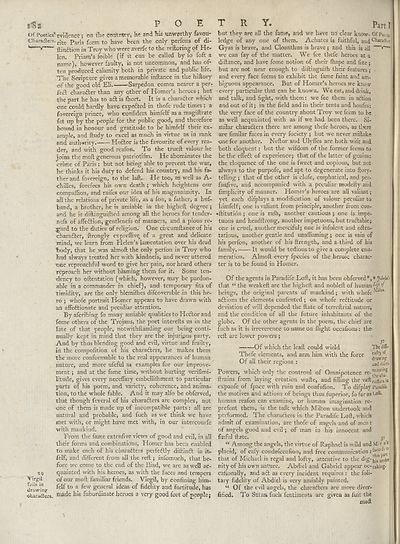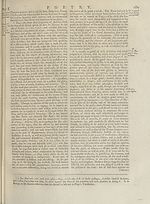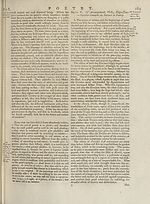Encyclopaedia Britannica > Volume 15, PLA-RAM
(220) Page 182
Download files
Complete book:
Individual page:
Thumbnail gallery: Grid view | List view

it§ s POE
of Poetica’ evidence 5 on the cotttrsrvv he and his unworthy favou-
Charadlerf. r;te parj3 fcem to have been the only perform of di-
ftindfion in Troy who were averfe to the reftoring of He¬
len, Priam’s foible (if it can be called by fo foft a
name), however faulty, is not uncommon, and has of¬
ten produced calamity both in private and public life.
The Scripture gives a memorable inilance in the hiftory
of the good old Eli. Sarpedon comes nearer a per¬
fect char after than any other of Homer’s heroes ; but
the part he has to aft i"s (hort. It is a chara&er which
one could hardly have expefted in thofe rude times : a
fovereign prince, who confiders himfelf as a magiltrate
fet up "by the people for the public good, and therefore
bound in honour and gratitude to be himfelf their ex¬
ample, and ftudy to excel as much in virtue as in rank
and authority.—— Heftor is the favourite of every rea¬
der, and with good reafon. To the trueft valour he
joins the molt generous patriotifm. He abominates the
crime of Paris: but not being able to prevent the war,
he thinks it his duty to defend his country, and his fa¬
ther and fovereign, to the laft. He too, as well as A-
chiiles, forefees his own death ; which heightens our
compaffion, and raifes our idea of his magnanimity. In
all the relations of private life, as a fon, a father, a huf-
band, a brother, he is amiable in the higheft degree ;
and he is diftinguifhed among all the heroes for tender-
nefs of affeftion, gentlenefs of manners, and a pious re¬
gard to the duties of religion. One circumftanee of his
character, ftrongly cxpreflive# of a great and delicate
mind, we learn from Helen’s lamentation over his dead
body, that he was aimoft the only perfon in Troy who
had always treated her with kindnefs, and never uttered
*)ce reproachful word to give her pain, nor heard others
reproach her without blaming them for it. Some ten¬
dency to oilentation (which, however, may be pardon¬
able in a commander in chief), and temporary fits of
timidity, are the only blemifhes difcoverable .in this he¬
ro ; whofe portrait Homer appears to have drawn with
an affettionate and peculiar attention.
By aferibing fo many amiable qualities to Hedlor and
fome others of the Trojans, the poet interefts us in the
fate of that people, notwithllanding our being conti¬
nually kept in mind that they are the injurious party.
And by thus blending good and evil, virtue and frailty,
in the compofition of his chara&ers, he makes them
the more conformable to the real appearances of human
nature, and more ufeful as examples for our improve¬
ment ; and at the fame time, without hurting verifimi-
litude, gives every neceflary embellilhment to particular
parts of his poem, and variety, coherence, and anima¬
tion, to the whole fable. And it may alio be obferved,
that though feveral of his characters are complex, not
one of them is made up of incompatible parts: all are
natural and probable, and fuch as we think we have
met with, or might have met with, in our intercourfe
with mankind.
From the fame extenfive views of good and evil, in all
their forms and combinations, Homer has been enabled
to make each of his characters perfectly diltir.Ct in it-
felf, and different from all the relt; infomuch, that be¬
fore we come to the end of the Iliad, we are as well ac-
19 quainted with his heroes, as with the faces and tempers
'Wrgjl of our molt familiar friends. Virgil, by confining him-
-d raw hie t0 a. feW &cnera* ideas f,delity and fortitude, has
characters. nyide fubordinate heroes a very good fort of people;
TRY. partI
but they are all the fame, and we have no' clear know- Of p0c,ic
ledge of any one of them. Achates is faithful, and ^ara<5br
Gyas is brave, and Cloanthus is brave; and this is all —'
we can fay of the matter. We fee thefe heroes at a
dillance, and have fome notion of their lhape and fize ;
but are not near enough to diflinguifh their features; -
and every face feems to exhibit the fame faint and am¬
biguous appearance. But of Homer’s heroes we know
every particular that can be known. We eat, and drink,
and talk, and fight, with them: we fee them in aCtion
and out of it; in the field and in their tents and houfes:
the very face of the country about Troy we feem to be
as well acquainted with as if we had been there. Si¬
milar characters there are among thefe heroes, as there
are fimilar faces in every fociety ; but we never miftake
one for another. Neflor and Ulyffes are both wife and
both eloquent: but the wifdom of the former feems to
be the effeCt of experience; that of the latter of genius:
the eloquence of the one is fweet and copious, but not
always to the purpofe, and apt to degenerate into ftory-
telling ; that of the other is clofe, emphatical, and per-
fuafive, and accompanied with a peculiar modefty and
fimplicity of manner. Homer’s heroes are all valiant;
yet each difplays a modification of valour peculiar to
himfelf; one is valiant from principle, another from con-
«ftitutibn ; one is rafh, another cautious ; one is impe¬
tuous and headltrong, another impetuous, but tradable;
one is cruel, another merciful; one is infolent and often-
tatious, another gentle and unafiuming; one is vain of
his perfon, another of his ftrength, and a third of his
family. It would be tedious to give a complete enu¬
meration. Aimoft every fpecies of the heroic charac¬
ter is to be found in Homer.
Of the agents in Paradife Loft, it has been obferved*, * Jduftn:
that “ the weakeft are the highell and nobleft of human
beings, the original parents of mankind; with whole
aClions the elements confented; on whofe reCtitude or
deviation of will depended the ftate of terrellrial nature,
and the condition of all the future inhabitants of the
globe. Of the other agents in the poem, the chief are
fuch as it is irreverence to name on flight occafions : the
reft are lower powers ;
•P
Of which the leaf! could wield The diffi-
Thefe elements, and arm him with the force tulry of
Of all their regions : S®.
Powers, which only the controul of Omnipotence re-
ft rains from laying creation wafte, and filling the vail ra^as in
expanfe of fpace with ruin and confufion. To difplay Paradife
the motives and actions of beings thus fuperior, fo far as Loft,
human reafon can examine, or human imagination re-
prefent them, is the talk which Milton undertook and
performed. The charadfers in tire Paradife Loft, which
admit of examination, are thofe of angels and of men :
of angels good and evil; of man in his innocent and
fulfill ftate. 31
“ Among the angels, the virtue of Raphael is mild and Mift i>’*
placid, of eafy condefcenfion, and free communication:^^1,:
that of Michael is regal and lofty, attentive to the dig-funder
nity of his own nature. Abdiel and Gabriel appear oc-taking.
Cafiottally, and adl as every incident requires : the loli-
tary fidelity of Abdiel is very amiably painted.
“ Of the evil angels, the charadfers are more diver-
fitied. To Satan, fuch fentirnents are given as fuit the
moil
of Poetica’ evidence 5 on the cotttrsrvv he and his unworthy favou-
Charadlerf. r;te parj3 fcem to have been the only perform of di-
ftindfion in Troy who were averfe to the reftoring of He¬
len, Priam’s foible (if it can be called by fo foft a
name), however faulty, is not uncommon, and has of¬
ten produced calamity both in private and public life.
The Scripture gives a memorable inilance in the hiftory
of the good old Eli. Sarpedon comes nearer a per¬
fect char after than any other of Homer’s heroes ; but
the part he has to aft i"s (hort. It is a chara&er which
one could hardly have expefted in thofe rude times : a
fovereign prince, who confiders himfelf as a magiltrate
fet up "by the people for the public good, and therefore
bound in honour and gratitude to be himfelf their ex¬
ample, and ftudy to excel as much in virtue as in rank
and authority.—— Heftor is the favourite of every rea¬
der, and with good reafon. To the trueft valour he
joins the molt generous patriotifm. He abominates the
crime of Paris: but not being able to prevent the war,
he thinks it his duty to defend his country, and his fa¬
ther and fovereign, to the laft. He too, as well as A-
chiiles, forefees his own death ; which heightens our
compaffion, and raifes our idea of his magnanimity. In
all the relations of private life, as a fon, a father, a huf-
band, a brother, he is amiable in the higheft degree ;
and he is diftinguifhed among all the heroes for tender-
nefs of affeftion, gentlenefs of manners, and a pious re¬
gard to the duties of religion. One circumftanee of his
character, ftrongly cxpreflive# of a great and delicate
mind, we learn from Helen’s lamentation over his dead
body, that he was aimoft the only perfon in Troy who
had always treated her with kindnefs, and never uttered
*)ce reproachful word to give her pain, nor heard others
reproach her without blaming them for it. Some ten¬
dency to oilentation (which, however, may be pardon¬
able in a commander in chief), and temporary fits of
timidity, are the only blemifhes difcoverable .in this he¬
ro ; whofe portrait Homer appears to have drawn with
an affettionate and peculiar attention.
By aferibing fo many amiable qualities to Hedlor and
fome others of the Trojans, the poet interefts us in the
fate of that people, notwithllanding our being conti¬
nually kept in mind that they are the injurious party.
And by thus blending good and evil, virtue and frailty,
in the compofition of his chara&ers, he makes them
the more conformable to the real appearances of human
nature, and more ufeful as examples for our improve¬
ment ; and at the fame time, without hurting verifimi-
litude, gives every neceflary embellilhment to particular
parts of his poem, and variety, coherence, and anima¬
tion, to the whole fable. And it may alio be obferved,
that though feveral of his characters are complex, not
one of them is made up of incompatible parts: all are
natural and probable, and fuch as we think we have
met with, or might have met with, in our intercourfe
with mankind.
From the fame extenfive views of good and evil, in all
their forms and combinations, Homer has been enabled
to make each of his characters perfectly diltir.Ct in it-
felf, and different from all the relt; infomuch, that be¬
fore we come to the end of the Iliad, we are as well ac-
19 quainted with his heroes, as with the faces and tempers
'Wrgjl of our molt familiar friends. Virgil, by confining him-
-d raw hie t0 a. feW &cnera* ideas f,delity and fortitude, has
characters. nyide fubordinate heroes a very good fort of people;
TRY. partI
but they are all the fame, and we have no' clear know- Of p0c,ic
ledge of any one of them. Achates is faithful, and ^ara<5br
Gyas is brave, and Cloanthus is brave; and this is all —'
we can fay of the matter. We fee thefe heroes at a
dillance, and have fome notion of their lhape and fize ;
but are not near enough to diflinguifh their features; -
and every face feems to exhibit the fame faint and am¬
biguous appearance. But of Homer’s heroes we know
every particular that can be known. We eat, and drink,
and talk, and fight, with them: we fee them in aCtion
and out of it; in the field and in their tents and houfes:
the very face of the country about Troy we feem to be
as well acquainted with as if we had been there. Si¬
milar characters there are among thefe heroes, as there
are fimilar faces in every fociety ; but we never miftake
one for another. Neflor and Ulyffes are both wife and
both eloquent: but the wifdom of the former feems to
be the effeCt of experience; that of the latter of genius:
the eloquence of the one is fweet and copious, but not
always to the purpofe, and apt to degenerate into ftory-
telling ; that of the other is clofe, emphatical, and per-
fuafive, and accompanied with a peculiar modefty and
fimplicity of manner. Homer’s heroes are all valiant;
yet each difplays a modification of valour peculiar to
himfelf; one is valiant from principle, another from con-
«ftitutibn ; one is rafh, another cautious ; one is impe¬
tuous and headltrong, another impetuous, but tradable;
one is cruel, another merciful; one is infolent and often-
tatious, another gentle and unafiuming; one is vain of
his perfon, another of his ftrength, and a third of his
family. It would be tedious to give a complete enu¬
meration. Aimoft every fpecies of the heroic charac¬
ter is to be found in Homer.
Of the agents in Paradife Loft, it has been obferved*, * Jduftn:
that “ the weakeft are the highell and nobleft of human
beings, the original parents of mankind; with whole
aClions the elements confented; on whofe reCtitude or
deviation of will depended the ftate of terrellrial nature,
and the condition of all the future inhabitants of the
globe. Of the other agents in the poem, the chief are
fuch as it is irreverence to name on flight occafions : the
reft are lower powers ;
•P
Of which the leaf! could wield The diffi-
Thefe elements, and arm him with the force tulry of
Of all their regions : S®.
Powers, which only the controul of Omnipotence re-
ft rains from laying creation wafte, and filling the vail ra^as in
expanfe of fpace with ruin and confufion. To difplay Paradife
the motives and actions of beings thus fuperior, fo far as Loft,
human reafon can examine, or human imagination re-
prefent them, is the talk which Milton undertook and
performed. The charadfers in tire Paradife Loft, which
admit of examination, are thofe of angels and of men :
of angels good and evil; of man in his innocent and
fulfill ftate. 31
“ Among the angels, the virtue of Raphael is mild and Mift i>’*
placid, of eafy condefcenfion, and free communication:^^1,:
that of Michael is regal and lofty, attentive to the dig-funder
nity of his own nature. Abdiel and Gabriel appear oc-taking.
Cafiottally, and adl as every incident requires : the loli-
tary fidelity of Abdiel is very amiably painted.
“ Of the evil angels, the charadfers are more diver-
fitied. To Satan, fuch fentirnents are given as fuit the
moil
Set display mode to:
![]() Universal Viewer |
Universal Viewer | ![]() Mirador |
Large image | Transcription
Mirador |
Large image | Transcription
Images and transcriptions on this page, including medium image downloads, may be used under the Creative Commons Attribution 4.0 International Licence unless otherwise stated. ![]()
| Encyclopaedia Britannica > Encyclopaedia Britannica > Volume 15, PLA-RAM > (220) Page 182 |
|---|
| Permanent URL | https://digital.nls.uk/191903636 |
|---|
| Attribution and copyright: |
|
|---|
| Description | Ten editions of 'Encyclopaedia Britannica', issued from 1768-1903, in 231 volumes. Originally issued in 100 weekly parts (3 volumes) between 1768 and 1771 by publishers: Colin Macfarquhar and Andrew Bell (Edinburgh); editor: William Smellie: engraver: Andrew Bell. Expanded editions in the 19th century featured more volumes and contributions from leading experts in their fields. Managed and published in Edinburgh up to the 9th edition (25 volumes, from 1875-1889); the 10th edition (1902-1903) re-issued the 9th edition, with 11 supplementary volumes. |
|---|---|
| Additional NLS resources: |
|

